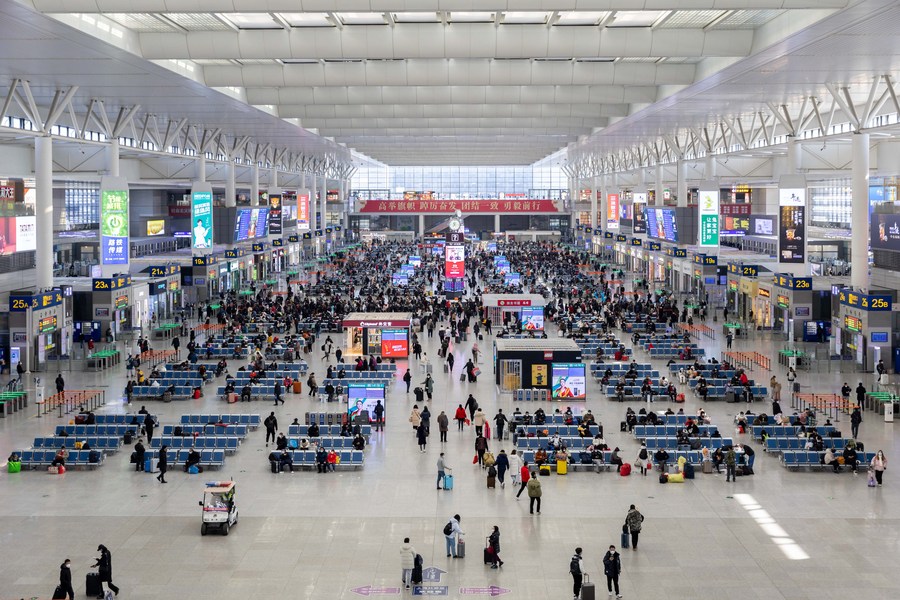
This photo taken on Dec. 24, 2022 shows the waiting hall of the Shanghai Hongqiao Railway Station in east China's Shanghai. (Xinhua/Wang Xiang)
BEIJING, Jan. 7 (Xinhua) -- China's transport sector has made full preparations to ensure smooth transportation and logistics during the upcoming Spring Festival travel rush, which will continue for 40 days from Jan. 7 to Feb. 15 this year.
"As the first travel rush after the country's optimization of its COVID-19 response, this year's Spring Festival travel rush will be the most challenging in recent years, with surging passenger flows coinciding with a surge of COVID infections," Vice Minister of Transport Xu Chengguang told a press conference on Friday.
ENHANCED TRANSPORTATION CAPACITY
Cross-regional travel is likely to increase as people plan tourist trips or travel for family reunions, after China recently downgraded its management of COVID-19 from Class A to Class B, Xu said.
The number of passenger trips during this year's Spring Festival travel rush is expected to surge by 99.5 percent from last year to reach nearly 2.1 billion, which would be 70.3 percent of the number seen in 2019, according to Xu.
To cope with the situation, China's railway operators have adopted flexible operating plans to increase transportation efficiency and better cater to people's travel needs.
A maximum of 6,077 return passenger trains will be put into operation during peak days before the holiday and a maximum of 6,107 after the holiday, and the seating capacity will be increased by 11 percent from the same period in 2019, according to the China State Railway Group Co., Ltd.
China saw some 4,100 kilometers of new railway lines begin operations in 2022, with over half that figure being high-speed railway.
"We will give full play to the advantages of our high-speed railway network amid the travel rush, and ratchet up the transportation capacity in key areas and at peak hours," said Huang Xin, head of the company's passenger transport department.
Wan Xiangdong, chief pilot of the Civil Aviation Administration of China, said the administration will increase the average daily number of flights to 11,000 during the holiday, equivalent to 73 percent of the pre-pandemic level in 2019, as there are increasing air passenger flows.
Domestic aviation companies are encouraged to add more flights on popular routes to meet the demand of passengers during the travel rush, Wan said.
ENSURING SMOOTH LOGISTICS
Freight transportation is also facing pressure during the holiday season, as medical supplies, daily necessities and holiday goods are in high demand.
To ensure the unimpeded transportation of medical supplies such as medicines, masks, vaccines and COVID-19 antigen test kits, local transportation authorities are being guided to provide targeted, advance support for key producers, and roll out company-specific measures to help remove logistics bottlenecks, Xu said.
Xu noted that a distribution system for the daily transportation of medical supplies has been established to intensify transportation capacities in key provinces and logistics enterprises, to ensure the timely delivery of medical supplies.
Since mid-December last year, the normal operations of postal and delivery services in some cities have been hampered by COVID-19 infections among delivery workers, resulting in delays and pile-ups of packages.
To restore efficient delivery operations, the country's State Post Bureau has urged companies to make contingency plans in light of their situations, including the recruitment of more delivery workers and the hiring of temporary workers, to prompt work resumption, said Chen Kai, deputy chief of the bureau.
Distribution centers have also been encouraged to maximize their operation capacities by optimizing delivery routes, extending service hours and carrying out night deliveries, Chen said.
With more couriers returning to work, the efficiency of the country's delivery services has quickly rebounded. For the first five days of 2023, the courier sector handled 370 million parcels on a daily basis, up 16.7 percent from the same period last year, according to Chen.
On Tuesday, a State Council executive meeting stressed that logistics companies will be supported to redistribute transportation capacities as appropriate and reinforce frontline staff, calling for efforts to provide greater care for couriers delivering goods and food, to ensure the stable operations of postal and delivery services during the Spring Festival.
"The country will continue to facilitate the smooth operations of both trunk and branch routes in transport and logistics, and guarantee the transportation of energy, foods and other key materials for this winter and next spring," Xu said.




 A single purchase
A single purchase









